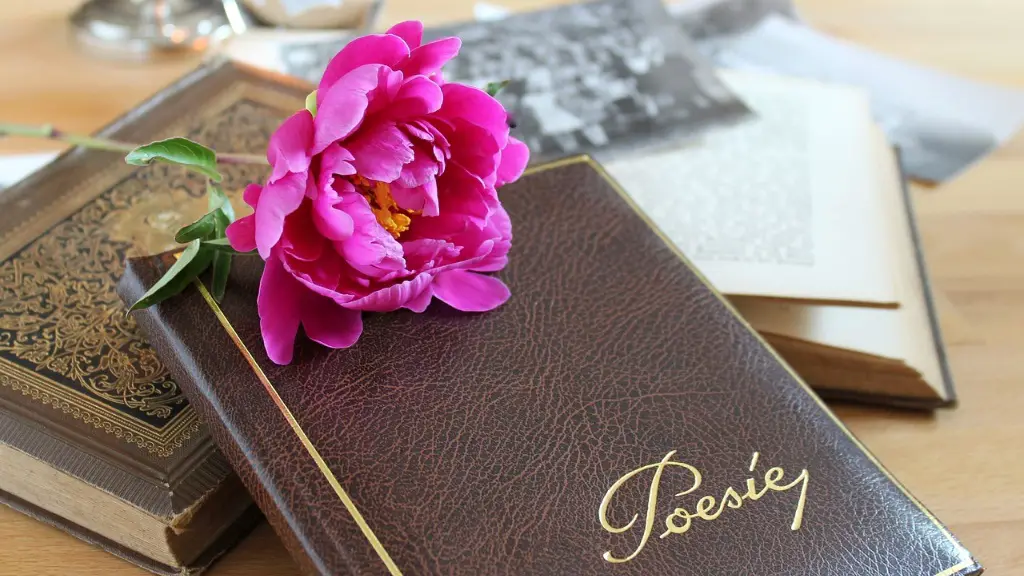What is poetry and how is it defined? The answer to this question is complex and nuanced, because poetry is a form of expression that is difficult to define. It is something that is hard to explain, and often words fail to capture the essence of a poem. There is a complexity and beauty to poetry that can’t always be expressed in simple language.
Still, there are certain elements that comprise the genre and make it distinct from other forms of literature. Poetry is characterized by its use of imagery, metaphors and similes, structure, sound and rhythm, and the emotion and tension that are woven into each verse. These elements, in combination with its unique style and structure, create a piece of work that stands apart from other types of writing.
The ability to express feelings, thoughts and ideas in a creative, moving way is what sets poetry apart. It is not just a form of writing – it is an art form that conveys emotions and deep-seated thoughts that humans rarely discuss openly. Poets are able to use this form of expression to shed light on topics that are hard to express, or that are uncomfortable or taboo. They are also able to evoke strong emotions from their audience, creating a deep connection and understanding through their words.
Understanding poetry is an individual process. It is subjective in nature and often relies on personal interpretations and experiences. Different people can read the same poem and come away with vastly different interpretations. The power of poetry is that each person brings their own experiences, opinions and feelings to the interpretation, making it a unique and personal experience.
The meaning of poetry is often open to interpretation, but its impact is clear. Poetry has the power to evoke strong emotions, express ideas and emotions complexly, and bring clarity to hard topics. It is an art form that is unlike any other, and can only be fully appreciated through the individual experiences of its readers.
Finding Inspiration
Poets often draw inspiration from their personal experiences or from a powerful emotion. This can come from daily life or from a traumatic event. A poem can also be inspired by an idea or a concept, or by a place or a person. Inspiration for a poem can come from anywhere, and a poet will craft a piece of work based on the things they observe or experience.
Often, poets find themselves writing poems with a distinct message or theme. This could come in the form of satire, observation, or the exploration of a particular topic. But whatever the message or theme, the poet will use the language and structure they deem necessary to convey that message effectively.
Poets craft their work with a purpose in mind, and with an audience in mind. They strive to create a piece of work that is powerful, poignant, and resonates with the reader. They attempt to have the poem speak to its audience, and convey the ideas and values they wish to express.
Poetry is a powerful form of expression, and has been used throughout history to move people, evoke emotion, and bring understanding. Whether it is classic literature or something modern, it has the power to transform and inspire its audience.
Writing Poetry
Writing poetry is an art form, and mastering it takes time and practice. Poets have to learn the basics of language and structure, as well as the nuances of each type of poem. It is important to learn the conventions and rules of writing, in order to construct effective pieces that can be understood and appreciated.
It is also important to read and observe the work of other poets. Reading their work can provide insight and spark ideas, while observing their techniques can help a poet create something unique. Poets can also take risks and experiment with structure and language, pushing their writing in new directions. This can help them create something distinctive and powerful.
Finally, poets must remain dedicated to the craft. Writing poetry is more than just assembling words on a page – it involves the manipulation of language and form. As such, poets must dedicate the time and energy to perfecting the craft of poetry and creating work that is powerful, engaging, and effective.
Why Poetry Matters
Poetry is a powerful form of expression, and its importance cannot be overstated. It allows us to express our deepest thoughts and our most delicate emotions. It allows us to explore difficult topics and discuss them in a creative and meaningful way. Poetry allows us to gain insight into our own experiences, as well as those of others, and to gain a better understanding of the world around us.
Poetry also moves people in profound ways. It helps educate and inspire, and can open our minds to new ideas and perspectives. It can bring us comfort in times of grief and celebration in times of joy. It can help us gain insight into our own lives, and can bring clarity in times of confusion.
With its unique language and its powerful messages, poetry has an amazing ability to touch its audience. It can be deeply moving, inspiring, and even life-changing. Poetry is an important part of our culture, and should be valued and appreciated.
Expressing Poetry
Poetry is often seen as a solitary activity, but it can have great power when spoken aloud. Performance poetry is a powerful form of expression, and can reach and move audiences to powerful heights.
Performance poetry is usually energetic, passionate, and engaging. It utilizes the full range of vocal expression, from intonation and emotion, to volume and rhythm. It is an art form that allows poets to draw from the power of their own emotions and express them in an engaging way.
Performance poetry can be used to bring attention to an issue, to evoke strong emotions, or to simply entertain. It uses the power of spoken language to bring the poem to life, creating an experience that is unique and engaging. It can be a powerful tool for reaching a wide audience, and raising awareness of topics that can have a big impact on our lives.
Teaching Poetry
Poetry can be intimidating for some people, and it can be difficult for them to understand and appreciate its nuances. Teaching poetry can help make it more accessible, while also helping to foster a love and understanding of the craft. Teaching poetry in an accessible and engaging way can help people gain an appreciation and understanding of what makes it unique and powerful.
Poetry teachers need to be able to explain the conventions of poetry and the different types of poems in an effective manner. They also need to be able to illustrate how to read and interpret a poem, and to help the student gain an understanding of what the poet is trying to communicate. Finally, they need to be able to make the material accessible and engaging, in order to help the student understand and appreciate poetry.
Teaching poetry can help people gain a greater understanding of the art form and the power it has. It can help students to gain a deeper appreciation for poems, and to discover for themselves the joy of writing and reading poetry.
Publishing Poetry
Publishing poetry is a way for poets to share their work with a wide audience. It can also be a great way for a poet to gain recognition for their work, and for it to reach a larger audience.
In order to publish a poem, a poet will first need to find a publisher. They can search online for publishers that accept poetry, or they can submit their work directly to a literary magazine or journal. Once they find a publisher, they will need to write a query letter and submit their manuscript. The publisher will then read the submission and decide if they want to publish it.
Publishing poetry can be a great way to reach a large audience, and to gain recognition for their work. It can also be a great motivator and a boost to a poet’s career. But regardless of whether or not a poem is published, it can still be a powerful form of expression and a meaningful form of art.
The Power of Poetry
Ultimately, poetry is an incredibly powerful form of expression and art. It has the ability to express complex emotions and personal insights through its unique language and structure. It can evoke strong emotions, bring understanding, and even life-changing experiences for its readers.
What can be explained is not poetry. It is something that transcends words and explanation. It is something that needs to be experienced, felt, and understood. It is something that can only be captured by those who are willing to tap into the power of language and emotion, and to explore the depths of creative expression.





